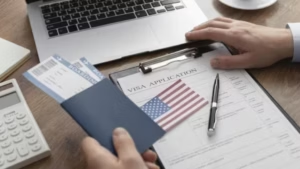
The U.S. government has intensified its crackdown on fraudulent green card applications, with a particular focus on the EB-1A “extraordinary ability” visa category — long considered one of the most sought-after pathways for highly skilled immigrants. Immigration attorney Rahul Reddy recently revealed that many EB-1A petitions, predominantly filed by Indian nationals, are now being re-investigated, with several already facing revocation.
In a recent video on his YouTube channel, Reddy Neumann Brown PC, Reddy explained that U.S. Citizenship and Immigration Services (USCIS) is revisiting multiple approved EB-1A petitions, particularly those suspected of utilizing questionable methods to strengthen their applications.
According to Reddy, some applicants allegedly manipulated the system by publishing in low-quality journals, generating fake citations through coordinated co-authorship, and obtaining dubious awards such as the Stevie and Globee. In many cases, petitioners reportedly paid agencies to fabricate or package these achievements, presenting them as legitimate credentials to meet EB-1A requirements.
A social media post, cited by Reddy, claimed that a network of around 200 individuals collaborated to enhance each other’s profiles, even offering such services for a fee. These developments have surfaced amidst USCIS’s broader efforts to clean up the EB-1A category and maintain the integrity of the program.
“The crackdown, though severe, is being welcomed by many Indian applicants who have followed legal routes,” Reddy noted, expressing hope that these enforcement actions will restore fairness and integrity to the system.
However, the consequences may extend beyond new denials. Legal experts warn that USCIS may reopen previously approved I-140 petitions and even revoke green cards if fraud is suspected.
The Law Office of Thomas V. Allen, in a widely circulated LinkedIn post, issued a stern warning to prospective EB-1A applicants being approached by overseas case-building agencies:
“Think twice before paying for an EB-1A case builder. They charge thousands to create ‘evidence’ to meet the regulatory criteria. But USCIS is cracking down.”
The firm further reported a sharp increase in Notices of Intent to Deny (NOIDs), Notices of Intent to Revoke (NOIRs), and actual I-140 revocations. They cautioned that these shortcuts, even if initially successful, can carry long-term consequences. Fraud concerns could jeopardize future immigration benefits, adjustment of status, or even naturalization applications.
The EB-1A visa category is specifically designed for individuals who can demonstrate extraordinary ability in fields such as science, business, athletics, or the arts. Applicants are expected to meet strict eligibility criteria with verifiable, genuine documentation.
“EB-1A is a powerful path—but it’s not meant to be gamed,” the Thomas V. Allen post emphasized. “The documentation must be truthful, traceable, and defensible.”
The EB-1A crackdown is part of a larger enforcement trend. In a related action, the U.S. Department of Justice recently fined California-based tech staffing firm Epik Solutions for violating the Immigration and Nationality Act by discriminating against U.S. citizens in favor of H-1B visa holders.
The DOJ determined that Epik Solutions posted job advertisements that explicitly excluded American citizens. As part of the settlement, the company agreed to pay $71,916 in civil penalties, reform its hiring practices, and undergo compliance training under the Protecting U.S. Workers Initiative.
With these moves, U.S. authorities are sending a clear message: while legal immigration pathways remain open, attempts to exploit the system will face strict scrutiny and severe consequences.
Recent Random Post:
















